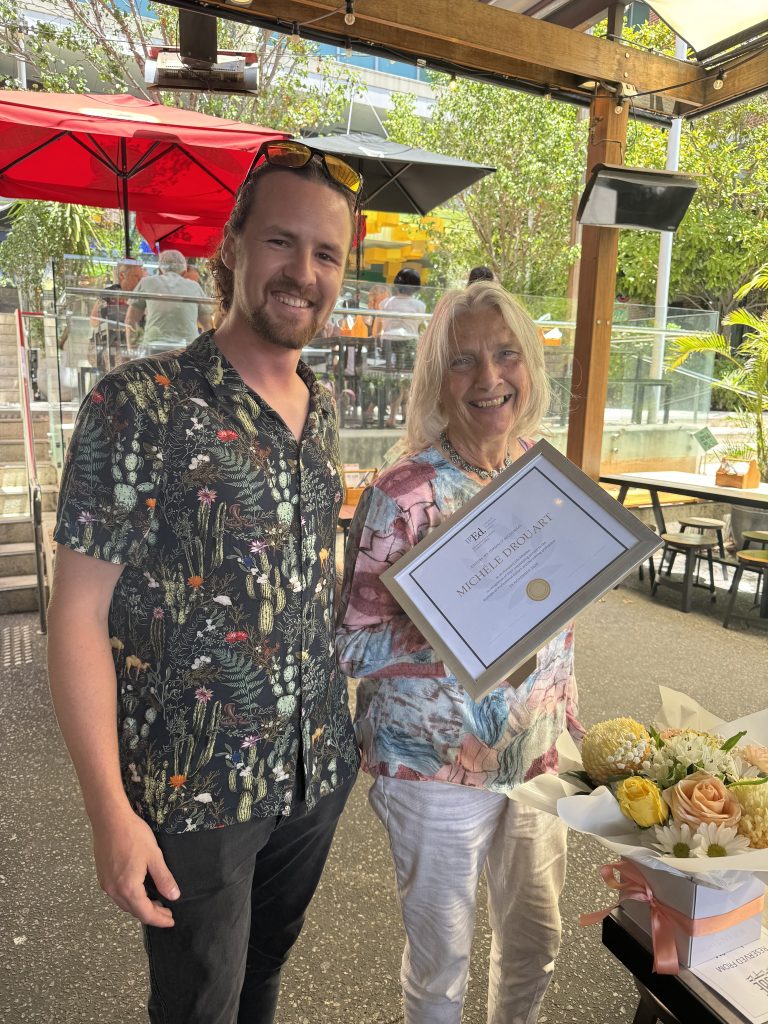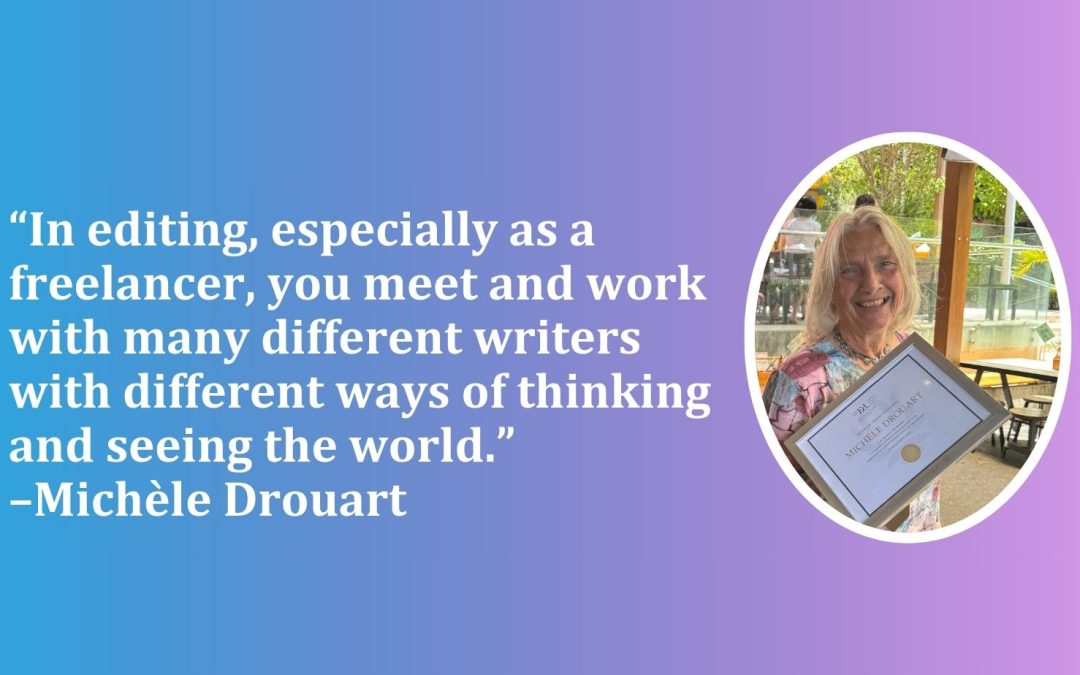From Editors Western Australia
Michèle Drouart is an award-winning author and editor; and an early member of the Society of Editors Western Australia (SOEWA), and the Institute of Professional Editors (IPEd). She was recently awarded Honorary Life Membership (HLM) in recognition of her service to the profession.
Michèle has a PhD in French Literature from Indiana University Bloomington and lectured in English and Comparative Literature at Murdoch University from 1991 to 1996.
From an early age, Michèle loved to read. Her immersion in French, English, and European literature, combined with a thirst for knowledge, set the stage for her eventual career in writing and editing. With an adventurous spirit she explored interesting parts of the world. But it wasn’t until the early 1990s that she ventured into the world of editing, where, she says, she found “her tribe”.
Starting a freelance editing business while writing her award-winning memoir Into the wadi (about her time in the Middle East), Michèle later founded a thriving creative writing school in Western Australia.
For years, she balanced the dual roles of teaching and editing. But the true inspiration for her endeavours, she says, has always been her “love of reading.”
Milestones and challenges
“A standout in my career was having Into the wadi accepted for publication by Fremantle Press (launched in 2000), and having my sister with me at the Premier’s Awards dinner in 2001.
“I cannot forget how we turned towards each other, wordless, staring open-mouthed, when my book was announced as the winner. It was so good to have her with me. We were close; she died in 2004.”
Another “great surprise” was the success of her creative writing classes. “I am no businessperson!” she says. “I started up in community centres, back rooms of cafés, and sometimes my little apartment.” During this time “my editing was quietly gaining in level/skill and in numbers of clients”.
What has given Michèle the most reward in her career, she says, is “the great joy to receive the warm appreciation of students and clients as we worked together through a manuscript and when we came to the end, both of us grateful and happy”; including seeing two students and clients shortlisted for the TAG Hungerford Award, one (a memoir) in 2014 and one (a novel) in 2016.
“Another lovely and memorable time was reading the letters I received from former students after announcing my retirement from the regular creative writing courses in 2019. Some were even students from my university courses years earlier, people I had no idea had remembered me.”
Sometimes, Michѐle’s milestones came unexpectedly. In 2004 a gold mining company asked her to edit their submission for a safety and health award. “We won that prize,” she says with satisfaction. “Of course, the site managers and nurse did all the work, but I believe my editing of the beautiful glossy submission did help to clinch it for them.”
In the beginning, though, her editing tasks were far removed from the narrative writing she loves.
“The hardest task that I’ll never forget was a huge instruction manual for staff at a casino! For those just starting out, this is the sort of thing that can put you off, but don’t give up. You do find yourself at last able to choose what to work with. It’s a matter of time, practice and building up your reputation.”
Her best professional growth, she believes, has been in manuscript assessments. These she describes as being a “major (first) step in editing …, invaluable to the editing process and to the clients’ own revisions of their work”.
Community and growth
As an early member of SOEWA, Michѐle recalls the group being a bit formal and reserved, but that over time, they relaxed and enjoyed each other’s company more and more.
“It’s not easy to find like-minded people, and when you have the luxury of choosing an occupation or profession that best matches your sense of identity, it’s wonderful to find others with similar aspirations and worldviews.”
Joining IPEd in the early days, she remembers the initial trepidation felt about becoming part of a much larger group, now an international group.
“I can’t say that we don’t still have a few gripes about becoming so huge, but then, as we came to know other editors … there was a real sense of togetherness and enrichment.
“The conferences have been especially inspiring, as has the awareness of our development as a professional group with increasing strength, recognition and mutual encouragement among individuals and branches. That really has been wonderful!
“With the help of IPEd, we have become a much more recognised and respected profession. We are at the beginning of a time of basking in the appreciation of those we work with – writers, publishers, media, education experts, businesses and corporate experts to mention just a few and every kind of reader.”

Editors Western Australia branch president Liam Selby AE and Michèle Drouart HLM. Image: Supplied.
Philosophy as an editor
“It is essential to encourage students and clients to believe in themselves and their work. Even though I’ve occasionally been obliged, and decided it is kinder, to reject working with someone who lacks the level of literacy needed to be a writer, I give only support to the rest. That is why, as an editor, I emphasise starting with an assessment.
“My critical comments and reservations always follow support for the aspects that are working well – and I can always find plenty that do. Since I retired from my regular teaching, a few of my former students have gone on to form their own writing groups based on a core principle of my classes: discussing what works best for them in a fellow writer’s work before going on to speak of their reservations. This approach has proved invaluable.
“I should clarify at this point that reservations should still be expressed. Sensibility does not have to mean avoidance or pussy-footing. It’s a balancing act; you weigh, instead of casting judgement.
“In editing, especially as a freelancer, you meet and work with many different writers with different ways of thinking and seeing the world. They vary in their level of language use and ability, in the influences from their own reading, in the writing they want to do and the genres they choose, and so much more. I never push that away. It’s only to be celebrated.”
Looking ahead
“Structure in narrative writing (fiction and nonfiction) has become my main area of specialisation, both in teaching and in editing. For me personally, it’s important to be able to pass on that knowledge and expertise to others, particularly because I believe there are aspects of this feature that have not been fully addressed. This makes me realise that time is passing, and what a shame it would be if I didn’t manage to share that understanding. I’m considering presenting a paper or workshop on narrative structure at our next conference.”
At a broader level, Michѐle believes that it’s important to continue to spread the enthusiasm for what editors do, through IPEd and through continuous learning.
“I took Max McMaster’s indexing course on Zoom last year and have now successfully produced my first index for a book I edited a few months ago.”
Final words
“When I started out in editing, there were no courses offering it as a subject in any of the tertiary institutions. You are very lucky to have these today, so do take full advantage of them.
“Also, do not lose faith. It’s very hard at first – promoting yourself, having to take on all kinds of editing work, learning how to run a business. And it all comes at you at once. But you do get through it. You also keep learning and improving, and as you develop the expertise you enjoy your work increasingly as well.”
Michѐle Drouart no longer offers writing courses, but she does run special presentations and workshops, on both writing and editing, and how to edit your own creative works. Contact Michѐle via IPEd’s Editors Directory.

